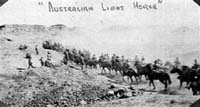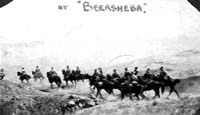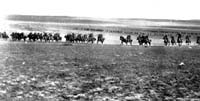 |
Then the order came down
along the lines of the Fourth and 12th. “Regiments …
form squadron line extended … form squadron line
extended.”
Photo from The Australian
Light Horse Association
|
Harry’s
big adventure
Part I - published
ARMY Newspaper 10 October 2002
The boy who denied
his father for his country
Trooper Harold
Thomas Wickham
— The Boy —
The young trooper lay there,
grimacing in pain. The doctors had done their best but now nothing
could be done. As the padre sat alongside the bed, he held the lad’s
hand.
Suddenly the soldier squeezed
tightly and dragged the padre closer. “You make sure they get it
right on the headstone…Please – make sure”. Then there was
silence as the soldier’s hand went limp and fell to his side. The
padre was puzzled and didn’t understand the young trooper’s
request.
Harry was a boy of the land. Lean
and wiry he stood 5 ft 4 in and weighed a scant 8 stone. He worked
hard on the family property in the tiny town of Walpeup, in northwest
Victoria. School didn’t interest him much but the adventure of the
outdoors did.
Level headed, a capable bushman,
handy with a rifle and a natural with horses, Harry displayed all the
attributes of the cream of Australia’s youth.
He admired the older blokes, the
ones he saw at the local dances, courting the girls and those lounging
against the verandah rails near the pub. He bubbled with youthful
exuberance.
He had followed the progress of the
war in the papers.
Many of the local men had joined the
Light Horse and they strutted around town before their deployment
overseas.
The cut of their tunics, the shining
leather of the bandoliers, boots and leggings, the emu plumes ruffling
in the breeze and a girl on each arm.
“This is for me!” Harry thought
to himself.
By the light of the kero lamp, he
would read the exploits of the diggers at Gallipoli.
The hair-raising adventures, the
madcap charges against machine-guns, the hand-to-hand battles against
incredible odds. It was everything he’d ever dreamed of.
Following the evacuation, he read of
the desert war. Jifjafa, Romani, El Arish and Rafa. Horses and men
working as one, charging across the dunes and getting stuck into the
enemy.
He noticed too when blokes he knew
came home, some minus arms, others legs, some blind.
Some didn’t make it home and their
mothers, sisters or wives went about the town dressed in black, their
eyes red through constant tears.
“Oh well, they are the risks you
take” the young lad thought to himself.
Harry knew his father wouldn’t let
him go to war, so no use asking.
One night he packed his bag and
placed a letter against the vase on the side table.
In it he said that he was off to do
a bit of Jackarooing in Queensland and he’d write when he could.
He crept towards the back door, ever
mindful that a creaking floorboard could give away his plan at any
moment. At the door he paused, looked back one last time and then he
was gone.
When his father awoke, he found the
letter. Reading through the page he said to himself – “bloody
little idiot.”
Harry presented himself at the Light
Horse recruiting centre on March 17, 1917.
As he filled out the paperwork, he
wrote in his name, Harold Thomas Wickham, age 21, and his next of kin
– uncle, Thomas Bell – Walpeup, Victoria.
The recruiting officer scanned the
lad carefully. “You look a bit young, got a birth certificate?”
“No sir, it was lost in a fire a
few years ago,” Harry replied.
“And your parents?”
“No sir, died in the fire. Got an
uncle but we don’t talk much.”
“Alright, we’ll see how you
go,” the officer said.
For Harry the test was a breeze.
Ride a horse bareback, jump a fence and a bit of dodging and weaving.
The other recruits cheered as they
watched Harry put the horse through its paces.
Galloping to the finish, he brought
the horse to a sliding halt and jumped off running, all in one fluid
motion.
He was allocated first to the 13th
Light Horse Regiment but this was later changed to the 4th Light
Horse. Young Harry relished the closeness of military life. The men
around him treated him as nothing but an equal.
Musketry, bayonet drills, navigation
and drill. He thrived in the training and displayed the natural
attributes of a born soldier.
He even had a grin when it came to
mucking out the stables – just part of the job.
The only sad time came at mail call,
for his name was never called out.
Harry embarked for Egypt on June 22
1917, arriving in Suez six weeks later.
A further period of orientation and
training was undertaken. But, most importantly, he was issued with his
horse.
The pair soon got to know and trust
each other, they enjoyed long rides in the surrounding desert and on
returning to the lines, the trooper would take particular care in
grooming his mount.
The lad was fair but firm and his
trusty steed responded to his every command without hesitation.
They knew they were a team and they
knew that they'd be a good one.
 |
The men had their water
bottles but there was nothing for the horses.
Photo from The Australian
Light Horse Association
|
What Harry did next
Part II - published
ARMY Newspaper 7
November 2002
On September 19 Trooper Harry
Wickham was “taken on strength” of the 4th Light Horse Regiment
AIF.
Harry was assigned to a Hotchkiss
machine gun section and also tasked with the care of one of the
packhorses. He worked hard to master the new weapon and with another
horse to care for, it just meant twice the fun.
The British and Anzac forces were
preparing for action. They had attacked Gaza twice and twice they had
failed. The Light Horse patrols seemed to be ranging further and
further into the desert along the Wadi Gaza towards the fortified town
of Beersheba.
Morning of October 28, 1917 Harry
was tending to his horses. His corporal approached him.
“Harry, we move out late this
afternoon, full marching orders, three days rations for man and horse,
make sure the horses are fully watered before we go, don’t know when
we’ll hit water again.” The NCO’s less than normal jovial mood
told all.
“No problems corp, we’ll be
ready,” the young trooper replied.
As the corporal walked away, Harry
nuzzled into his two charges.
“Looks like this is it eh, the
real bloody thing!”
At 4pm the regiment was ready to
move. The men waited with anticipation and then it came – the hand
signal from the CO and they were off.
They rode through the night to
conceal the dust. It was to be a silent march, no smoking, no talking.
Aircraft buzzed around in the distance to conceal the noise.
The Fourth was only one regiment
among many. Thousands were being thrown into this battle, aimed to
capture the abundant wells nestled within the heavily defended
perimeter of Beersheba. They tried to get what rest they could during
the day and were in the saddle again that night. The men had their
water bottles but there was nothing for the horses. It was the same
next day. The morning of the 31st they found themselves overlooking
the town.
The Fourth and its sister regiment,
the 12th, were held in reserve. The third regiment of the Brigade, the
11th, was off on another task.
As the battle raged, the Fourth and
12th lay in a sheltered wash out. Even though it was the end of
summer, the sun still bore down fiercely on both man and horse alike.
The men still had only the remnants of water in their bottles, as for
the horses, their water lay either in Beersheba or the unthinkable –
a 12-hour forced march to the rear.
The diggers watched as the shadows
lengthened. “If they don’t take the town soon, we’re well and
truly stuffed,” one said.
The words stuck into Harry like a
knife.
Then the order came down along the
lines of the Fourth and 12th. “Regiments … form squadron line
extended … form squadron line extended.”
“Shit, what’s going on here?”
one trooper said.
They shook out, covering off the
pennants that marked their forming up place. Harry looked around, he
could see the buildings in the distance and the broken, undulating
ground between them and the town.
The squadron sergeant major galloped
along the front of the troops. “What’s going on, sir?” the
corporal asked.
“We’re gonna charge Beersheba
mate!” the warrant officer replied.
The regiments now straddled a road.
The Fourth on the right, the 12th on the left. The 11th were trying to
get back to them and if the soldiers arrived in time, they would be in
depth.
The CO of the Fourth would lead both
regiments. He pulled his hat down tightly on his head and raised his
hand. Harry looked at his corporal, who turned towards the lad and
winked. A smile broke across the boy’s face. Then they were off at a
slow walk.
As his horse became skittish, Harry
rubbed its neck to let him know everything was all right. He glanced
over his shoulder where his pack horse, laden down with the weight of
the machine gun and ammunition, followed obediently.
The pace now quickened to a trot,
then increased to a canter. All the time the Turkish and German
defenders adjusted the range of their guns in preparation to engage
the horsemen when they stopped to dismount – then it came … one
curt command. “Charge!” and they were off.
The enemy was taken aback. This
wasn’t supposed to happen. They hurriedly twirled the handwheels in
a vain attempt to depress the barrels of the guns. Then they gave
their order. “Fire!”
The high explosive and shrapnel
rounds blasted into the ranks of horsemen. Some were hit but most
simply laid down further on their horse’s neck to gain whatever
protection they could.
 |
Thousands of Light
Horsemen were thrown into this battle, aimed to capture the
abundant wells, nestled within the heavily defended
perimeter of Beersheba.
Photo from The Australian
Light Horse Association
|
Harry readied himself as he
approached the curtain of fire. Blam, Blam, Blam. Red-hot splinters
whizzed around him. A strange mixture of fear, excitement, panic and
glee overcame him. He laughed out loud as he spurred his mount to
produce more and more speed. Suddenly there was silence they were
under the guns.
He could see little orange flashes
and could hear whistling overhead. “I wonder what that is?” Harry
thought. His answer came all too soon, as a machine gun round smashed
into his leg. He never thought such pain existed – the force of the
round threw him from the horse. He bounced along the ground and came
to a halt in the dirty, broken soil. The sound of thundering hooves
warned him to cover his head as another wave of horsemen galloped over
him.
He glanced down at his leg, it lay
at a grotesque angle, the result of the bullet shattering his femur.
Then things started to blur as he succumbed to the pain, which lapsed
him into unconsciousness.
As he struggled to regain
consciousness, he felt the warmth of morphine, interrupted
intermittently by the sharpness of excruciating pain.
As the padre sat next to him, Harry
asked how the regiment had fared. “We took the town Harry, and the
blokes and horses are enjoying a good drink.”
Harry lapsed in and out of
consciousness throughout the night. In the morning he was still alive
but only just. The padre again called on him. “Make sure they get
the headstone right,” Harry screamed, and with that the young
trooper went limp.
The next day, Harry was buried in a
temporary cemetery on the outskirts of the town.
Back home, Thomas Bell received a
telegram from Army Headquarters. It informed him of the death of his
‘nephew’ Harry.
Bell wrote back to the Army to
highlight their error. “I don’t have a nephew named Harry. I do
have a son by that name but he couldn’t be in the Army, he’s only
16."
- I found the grave of Trooper
Harry Thomas Bell alias Harry Wickham when serving in the Middle
East. While I can only surmise the events leading up to Harry’s
death, I believe it to be characteristic of many under-aged
Australians who fought in both wars under assumed names, more
often than not without the parents knowledge or consent. And yes,
they did get it right on the headstone. – WO1 Darryl Kelly
|